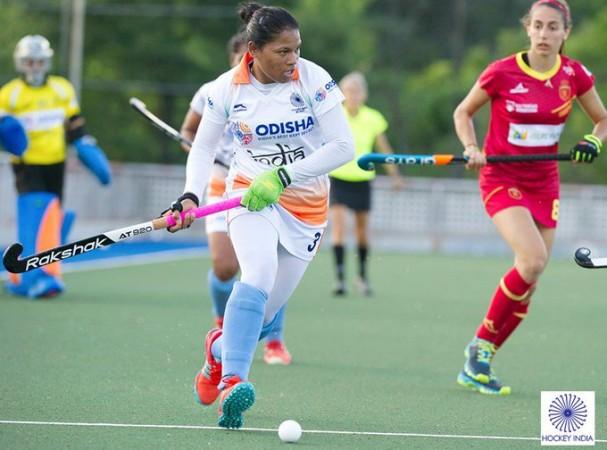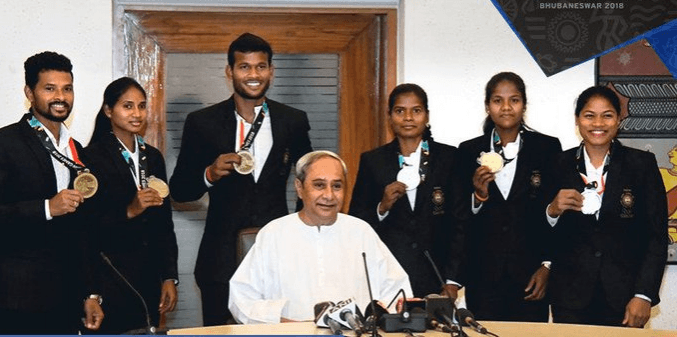
The state of Odisha has always been a major force in Indian hockey. It's distinctive mark has been the number of high-quality defenders it has produced. Continuing that glorious tradition is Deep Grace Ekka. The 25-year old girl has played a key role in making the Indian women's hockey team a major force in the world.
Her strong defending and determination to not let attackers from the opposition through has seen her rise to be one of the senior players in the side with more than 180 caps. In an exclusive interview with Akshay Saraswat of International Business Times, India, she talks about the role of a full back in the team as well as the great love of hockey that still exits in the hinterland of her state. She also describes the ways in which, despite lack of proper equipment, young players in Odisha continue to remain attached to their favourite sport.
You are from Odisha. This state has a great tradition of producing top-quality defenders for the Indian team. What is the reason for this?
Deep Grace: As far as I am concerned, I wanted to become a goalkeeper. But my coach at that time asked me to play as a defender because my brother was also playing as a goalkeeper.
As a defender, what is more important, having good skills or being physically strong?
Deep Grace: Obviously, it is necessary to be strong because attackers from foreign teams are physically very tough. So to stop them, one needs to be strong. And when it comes to skills, they matter more when it comes to creating an outlet for the ball. That's because for giving the ball an outlet, you sometimes have to play the scoop, or use a hit or a slap. Skills become important then.

Since the Indian teams play a very aggressive brand of hockey these days, are you also expected to move forward when the team presses for a goal. Or are you asked to stay back in order to check a counter-attack?
Deep Grace: Mostly, I stay back, as the last defender. It's not my role to go too far up the pitch. That's because the more I can control things at the back, the better it is. I have to guide the defenders on the left and right flanks as well as those who are ahead of me, regarding how far ahead or back they should go. So, it's on the basis of this that I play and train with these players.
And how important is the communication with the goalkeeper? Do you have a good understanding with Savita, especially when there is an attack from the opposition?
Deep Grace: So, Savita is, obviously, behind me. If she has to pass on some information, she tells me and I guide the players ahead of me. Sometimes, however, the pressure is so high that players ahead of me are too caught up. At such times, it is not possible to talk to each other. Hence, you have to take the decision yourself.
Captain Rani told us that the coach is especially focussed on improving the defence of the team. As a senior defender, what are the biggest changes that you see in the defensive structure of the side in the last year and a half?
Deep Grace: Earlier, what used to happen was that, when the team went on an attack, players used to charge forward without looking back as to whether we had any supporting attackers or not. That's probably why we were having difficulties in scoring goals. We were able to score just 1-2 goals and often had to be content with penalty corners. We have been practicing with this aspect in focus: How much should we move forward and when we need to stop. We are practicing on these aspects and are improving.
Tell us about yourself. How did you get acquainted with hockey and decide to become a professional player?
Deep Grace: There were many players, senior to me, who belonged to my village. So, I knew they play hockey but didn't know much about how good a sport hockey is. We used to play hockey in our village, like most others, just for fun. Then later on, I went through the trials to get admission into one of the hostels for hockey players. Then, I joined the hostel and kept moving higher through the grades. I started feeling that this is a good sport.

And were you always playing as a defender or did you play in other positions as well?
Deep Grace: Initially, I was playing in the left-half. Earlier, we used to have half-backs and then the defenders. But now, there are three defenders. Later, I was chosen to play as a defender.
I wasn't that fit, during my time in the hostel and wasn't able to do much running. So, I was chosen to play in a position where I don't need to run much. So, I was given the role of a defender.
When you used to play hockey in your village, what kind of facilities were there? The ground where you played, was it just an open space or a proper field?
Deep Grace: No, it wasn't a proper ground but just an open space. We used to go there and play after school. Though we played in school as well, but there wasn't much space. So, we played just for our own fun.
Where did you get the sticks from?
Deep Grace: We used to make our sticks from the wood available in the jungles. Then later on, when my brother came to the hostel, he starting giving his own stick to me.
So, your brother is also a hockey player?
Deep Grace: Yes.
He played till which level?
Deep Grace: He only participated in the camp but hasn't played at the international level.
How old were you when you first played hockey?
Deep Grace: 14-15.

Before that, you had no interest in the game?
Deep Grace: I was playing other games. Anything, be it football, kabaddi, we were playing lots of sports but hockey was difficult because getting a stick wasn't easy. That's why we didn't know much about how to play this game. We would just hold the stick and try to play.
Is the culture of hockey still strong in Odisha? In other states, youngsters mostly want to play cricket. Is it the case in Odisha that young people still like to play hockey?
Deep Grace: In our village, every house has hockey players only. It's not like that some people play cricket or other sport. In recent times, some youngsters have started playing football. But mostly, it is still hockey that everyone likes.
The Odisha state government is also giving a lot of support to hockey. A lot of tournaments are being played there. Do you think that would help the sport in your state?
Deep Grace: Yes, definitely, it will help. For example, when we win a game, we get the prize money. When young players in hostels see that, they also get motivated. So, for them also, it is a good thing that our government is supporting the game so much.
Students, who are in hostels, suffer from lack of money, especially to buy the equipment. If by seeing other hockey players do well financially, the youngsters also want to learn the game, it is good. They would feel that if we also work hard, we will also get such rewards.

What is the current state of infrastructure for hockey in Orissa?
Deep Grace: Presently, it is quite good. There are good tournaments being played in the state, so it is good.
Bhubaneswar has good facilities but what about small towns and villages? Do they also have good enough arrangements for players?
Deep Grace: It's not that great. But now, even we can help. If children in a certain village want to play hockey but don't have sticks and other equipment, if we help them, it will be good.
What other improvements would you like to see in hockey infrastructure of Odisha?
Deep Grace: So, for instance, in villages, kids are very keen to play hockey, they are passionate about the game but it is difficult to play on the grounds that are there. That's because there is no proper grass covering or even a good turf. If some proper grounds are made, that would be good.
And if I ask about the current crop of players from Odisha, are we going to see only defenders from the state in the national team or are their strikers and midfielders also that will emerge?
Deep Grace: Strikers, midfielders, they could all emerge. But for that, the hard work that youngsters have to put in while living in hostels, it is only that which would help bring about their emergence.
Lastly, in your state, do you get easily recognised as an international hockey star?
Deep Grace: Yes, I do get recognised but not that much. Because I am from a village.

















